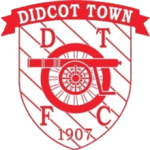
From Club Website:
By the turn of the 19th Century football in England was already well organised. However locally, and more precisely in Didcot, the game was played seemingly on an ad-hoc basis. A team going by the name of Didcot Village FC played on Station Meadow (now Cronshaw Close) and also, with the consent of the land owners, on a field near Britwell Road. Another team, Northbourne Wanderers (who consisted mainly railway workers), were playing on Northbourne Sports Ground.
In the history of English football the most noteworthy event of 1907 was the death of C.W. Alcock (the administrator who ‘invented’ the FA Cup). But for a small part of Royal Berkshire a more significant happening occurred when Didcot Village FC and Northbourne Wanderers amalgamated to form Didcot Town Football Club (exactly 50 years after the formation of Sheffield FC).
In the early days, and before joining any leagues, the new club played friendly matches on Fleet Meadow in extremely basic conditions. There were no proper changing facilities, least not by the standards of today; the goal posts were made from gas-pipe tubing and the pitch-lines were drawn using a biscuit tin with a hole in it pulled along by a piece of string.
In 1912 George Smallbone became club secretary. His appointment brought a massive improvement in the new club’s set-up. Organisation and better playing equipment followed, which paved the way for affiliation to the Berks & Bucks Football Association. At the same time Didcot Town joined the North Berks Junior League; and the club’s first success was only just around the corner.
Rivalry amongst clubs was prevalent even a century ago. This was no better illustrated when Didcot’s newly formed committee received letters threatening “to do damage” had Town won a game prior to a local derby with Harwell.
The first silverware in the club’s history was claimed in 1913 when Diddy beat Radley in the North Berks Junior Cup. The final was played in Abingdon in front of a huge crowd. This had been anticipated by the Didcot committee, and a police presence was requested. At a cost of five shillings (25p), two policemen were made available and they ensured the estimated one thousand spectators enjoyed Town’s victory with no reported problems.
Football had to take a back seat from 1914, with the outbreak of the Great War, and every club throughout the country many of the players and officials were called up to join the army. One of these Diddy volunteers was Private 15662 George William Haycroft, who joined 5th Battalion Royal Berks. Haycroft had played a key part in the club’s Junior Cup success and had a trial for Reading Reserves just before he enlisted. Sadly he was wounded in action and died a few days later in hospital at Abbeville on 11th October 1915. He was one of six men (either playing or in an official capacity at the club at the outbreak of war) who were to lose their lives in action in the First World War.
In 1918 (at the end of hostilities) it was decided that all of the club’s footballers who had served in the Great War would be remembered on a Roll of Honour:
S Lewthwaite*, G Beck*, W Walters, E Quartermain, H Hawkins, W Bennell, W Stroud*, N Jones, G King, G Haycroft*, W Brown*, E Talbot, R Ambrose, E Alder, P Fisher*, J Napper and D Campbell.
* Those who did not return from the war
Incredibly the club’s mascot, a teddy bear, had gone to France with the volunteers and had been safely returned to Didcot. But, alongside the Roll of Honour, it subsequently went missing, most probably because the club was still without a permanent home.
Post-WW1 Didcot Town FC re-entered the North Berks Junior League with a Reserve side playing in the 2nd Division. By 1923 the club comprised of two teams playing regularly on Saturdays, but there was soon to be added a third side under the Didcot Town ‘umbrella’. Didcot Wednesday FC (like the more famous and still-going Sheffield Wednesday FC) was a team made up mainly of local shop workers who couldn’t play Saturday football, but who had a half-day off for early closing on Wednesdays. They played in the Reading and District League and the club’s teams now found themselves playing games at Edmonds Park, Cow Lane and in a meadow owned by Mr Napper near Haydon Road. Not an ideal situation and finding a permanent, single base became a priority.
Towards the end of 1923 a lease was secured from Mr A T Loyd on land at Station Road. The ground was opened by a local MP in November, and the club was to call the Station Road its ‘home’ for the next 76 years.
The football club appears to have entered nearly two decades of relative stability but this, sadly, was not mirrored in the world of politics and the country once again faced war in Europe by 1939.
Back in 1927 the First Team had entered the Reading and District League (Division One). The club were runners-up in 1935-36 and eventually gained promotion to the Premier Division for the three years prior to World War II.
But football was the last thing on people’s minds as the 1930’s came to a close….
As with many popular pastimes of the day, football was effectively disbanded as an organised sport from 1939-1945.
Many local men went and fought for King and Country at this time and the football club was once again well-represented by its players and committee in the armed services. Two players are known to have been killed in service during World War II. James Edward Brown, a regular for the Reserve team prior to the war, lost his life on HMS Edinburgh in April 1942. His ship was torpedoed by a German U-boat and 57 sailors were killed in the initial explosion. The ship itself was sunk not by the enemy, but instead scuppered by HMS Foresight, off the coast of Russia, to prevent a large shipment of gold falling into the hands of the enemy.
Horace Victor Goodall, Royal Armoured Corps, played both for Didcot Town and Didcot Wednesday and he lost his life fighting in Europe (Italy) in September 1944 aged 25.
Club records become more reliable following the War. A supporters club was formed in 1947, an Organisation that eventually had more than one thousand members, and they arranged various functions to support the growing club. Fred Goodall, was one of the supporters club’s first secretaries. Alongside him local politician Steve Freeman took charge of the club itself.
In 1952 the Reserve side was admitted to the First Division of the Oxfordshire Senior League and won the Championship moving up to the Premier League.
In the same season the club lifted the Festival Cup following a thrilling 6-4 victory against Harwell at Station Road on Boxing Day.
Throughout this era the club, like many, attracted unprecedented support with most games, including Reserve Team games, watched by many hundreds of spectators.
Season 1953-54 will always go down in history of one of the club’s finest. Entering the Hellenic League in its inaugural year Didcot Town claimed the title winning 22 of their 30 matches and scoring an impressive 107 goals in the process. The newly won Hellenic shield was soon proudly on-show in a glass case at the Marlborough Club, which the footballers used as their HQ.
This was undoubtedly a very fine Diddy side with at least two players, skipper Ray Warr and left-winger Pete Sanderson, turning down offers from professional clubs to say at Station Road.
Despite the large crowds and successful team, Didcot Town relied heavily on the financial stability earned by the thriving supporters club. Keeping a club solvent was as difficult then as it is now, with the Championship winning season showing a tiny profit of just 1s. 6d despite record crowds. Taking over from Goodall as secretary at this time was Stan Stockwell, a former player. His father, Fred Stockwell, was in the team that had won the North Berks Junior Cup in 1913 as was his step-father Bill Lewthwaite. Alongside his mother it was Fred Stockwell who played a large part in organising the fundraising.
By the 1955-56 season, and with the club’s teams progressing well in their respective Leagues, Didcot Town employed the services of Jeff Gulliver (ex-Leeds and Reading FC) as team manager. It is believed that Gulliver was the first ‘paid’ official at the club.
It was also about this time that Steve Freeman persuaded Mr Loyd to sell the freehold for the Station Road ground. It was a key point in the club’s history and one that eventually, more than forty years later, would pave the way for our relocation to Loop Meadow Stadium. As Freeman commented at the time: “In many years to come, our ground will be worth very much more than the £3000 we paid for it!”. He wasn’t wrong…
After four seasons in the Hellenic League, Didcot joined the Metropolitan League in 1957 (where they stayed until 1963) and had some success including reaching the League Cup Final in 1961/62. It was during this time that many famous footballers played against Diddy at Station Road, often representing the likes of Arsenal and West Ham Reserves. Amongst them a certain Geoff Hurst, who played at least twice at Didcot, something which he later recalled when he was a guest speaker at the Club in 2003.
In 1963 Didcot returned to the Hellenic League where it remained until promotion to the Southern League in 2006.
Didcot waited until the 1965/66 season to taste success again when they won the Premier Division Challenge Cup (Witney Town were defeated 3-2 in the final replay at the Manor Ground).
On Sunday May 28th 1967 the club celebrated its 60th year with a diamond jubilee match between present and past players. The Didcot Past Team won 4-3 with Maurice Evans, Brain Thorne and Mick Burgess (2) grabbing the goals. Didcot Present replied with a brace from Mick Eldridge and one from Brian Gardener. Also the following season the Challenge cup was successfully defended but the club had to wait ten long years for further honours.
Indeed, the intervening years had seen Didcot demoted to Division One, but season 1976/77 not only saw a return to the Premier League as Div One champions (from Flackwell Heath) but also success in the Challenge Cup.
It took Diddy ten years, in 1987, to make a return to the Hellenic Premier Division after finishing in third place behind champions Bishops Cleeve and runners-up Cheltenham Town Reserves. The club benefited from Hellenic League rules which prevented Cheltenham Reserves from participating in the Premier Division and Didcot took the second and last promotion spot. The season was rounded off with success in the Division One Challenge Cup, where Cheltenham Town Reserves, again the victims, were defeated 2-0 in the final.
The club remained in the Premier Division for the next six campaigns, and managed a notable honour in 1992 when they lifted the Premier Division Cup (Banbury United defeated 3-0 in the final). Despite this success the following season resulted in disappointment with relegation to Division One.
However, within three years the club was re-instated to the Premier League.
Under the guidance of popular manager Robert Dodd the club had a highly successful season in 1997 lifting the League Cup, the pre-season Clanfield Cup and the midweek Hungerford Cup. But tragedy wasn’t too far away and the club was heartbroken when Dodd, aged just 44, passed away in June 1998.
One of the most significant events in the club’s 100 years was the move to the impressive new Loop Meadow Stadium.
As part of the redevelopment of Didcot town centre, Didcot Town FC were forced to relocate from their old Station Road ground for the start of the 1999/2000 season. The club moved onto the ever growing Ladygrove housing estate, the other side of the railway-line that cuts the town in two, but only a few hundred yards as the crow flies from the old home.
With good foresight the committee at the time decided to spend the majority of the money raised from selling the Station Road site (land which is now underneath Sainsburys car-park) on the club infrastructure including a magnificent main pitch. Alongside a second full size pitch, the new facility boasted a large function room, executive suite, a supporters bar (called Doddys, in memory of the late manager) and state-of-the-art physio room.
The first competitive match at the Loop Meadow was a 2-0 reverse against fellow Oxfordshire outfit Banbury Utd in front of 220 spectators. In forthcoming seasons crowds in excess of 200 were to become the norm as the club attracted a large and dedicated following both home and away.
The move to the new ground also had a significant impact on the club’s playing fortunes. In fact, the club established itself as one of the most consistent performers in the Hellenic Premier Division over the next 7 years, never finishing outside the top seven. And along the way silverware was lifted in the form of the Berks & Bucks Senior Trophy (2001 and 2003), the League’s Supplementary Cup (2003) and the Challenge Cup (2004).
Under new manager Stuart Peace Season 2004-2005 ended up as arguably the most successful in the club’s history so far following a memorable 3-2 win in the final of the FA Vase at White Hart Lane against pre-tournament favourites AFC Sudbury. This came on the back of the club retaining the League Challenge Cup with a 5-1 win against Carterton. Didcot came agonizingly close to claiming the treble but failed to win the League by a point despite amassing 97 points and winning 31 of their 42 matches. The club also ended with their best ever defensive record, just 21 League goals conceded including a remarkable 19 clean sheets at the Loop Meadow.
After a wait of 53 years the team finally brought the Hellenic League trophy back to Didcot in 2006 and with it the club ensured a move up into the Southern League for the first time. The Berks & Bucks Senior Trophy and the Hellenic League Challenge Cup were also claimed, the latter to make Didcot the first club to win the competition three times in a row. The League triumph broke all records with Town becoming the first club to reach more than 100 points in a season in the Hellenic League and the average points per game (2.63) gave Didcot the best record of any club at level 5 or above in British football that year.
The Loop Meadow Stadium is regarded as having one of the finest playing surfaces in the area. As a result the club has been able to regularly stage pre-season friendlies against Reading and Oxford United, and also host both Reading and Oxford Reserve matches. The largest crowd ever seen at the Loop for a match involving Didcot was in excess of 2600 in July 2006 when newly promoted Reading played their full-strength team against us. Incredibly Didcot took an early lead…unfortunately the Premiership new-comers hit back with nine goals of their own.
Southern League status was retained in the first year, and only a narrow defeat to Oxford City in the 2008 play-offs denied Diddy promotion the season following. But they didn’t have too long to wait.
A late run at the end of the season saw the club sneak into the play-offs, and following a victory at Windsor & Eton in the play-off semi-final, promotion to the Southern League Premier Division achieved in a 2-1 extra-time win at AFC Totton.
Diddy managed to retain their Premier Division place after finishing a creditable 15th position in 2009/10. A similar position may well have been realized the following season, but for the financial meltdown and mid-season demise of Windsor & Eton FC. Didcot were the only side to have taken 6 points off them at the time they folded, and with their record expunged, the lost points plunged Diddy to the bottom of the table where they never recovered.
Relegation back to the South & West Division also heralded an unprecedented turnover in managers. Stuart Peace had resigned in January, only weeks before the 6 point deduction. Ex-wales international Ady Williams took-over but he was to leave in the summer due to his media and television commitments. Francis Vines and then (ironically) the ex-Windsor & Eton boss David Mudge followed, the latter seeing Didcot to a mid-table finish at the end of the 2012 campaign.
Ex-Wimbledon and Swindon Town professional Gary Elkins was appointed two months into the 2012-13 season. Elkins marked a return to the club appointing a local manager living and working in and around Didcot; a throwback to the early years of the club more than a hundred years ago.
Elkins resigned at the end of that campaign and briefly replaced by Andy Wallbridge. Then in November 2013 record club goalscorer Ian Concannon and veteran defender Jamie Heapy were appointed as joint managers.
Jamie and Ians managerial reign started on a high for Didcot. After successfully steering Didcot away from a potential relegation battle to comfortable in mid table.
Their first full season in 14/15 had many highs and lows. An early FA Cup exit gave Didcot a chance to go unbeaten for 5 months in the league. Within the unbeaten run, Didcot made an FA Trophy which saw The Railwaymen take on Conference side Forest Green Rovers at The New Lawn. Despite the league position and being 2-0 down, John Mills and Lance Williams scored to force FGR to a replay at The Loop. A Jon Parkin hat trick ended any hopes of a shock in the replay however a memorable cup run and a serious test against a very good side.










